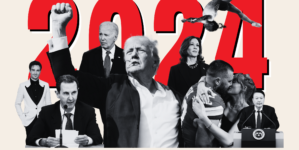-
Year in Review: What Moment Defined 2024? Newsweek Writers’ Verdicts - 35 mins ago
-
Encountering Italy and Germany on a Road Trip Through Southern Brazil - 42 mins ago
-
America’s Most Popular Christmas Movies Revealed - about 1 hour ago
-
How Netflix’s ‘Culinary Class Wars’ Made Chef Anh Sung-jae a Star - about 1 hour ago
-
Dodgers Considering Blockbuster Trade For Luis Robert Jr. - 2 hours ago
-
How to Keep ‘People Pleasing” From Ruining Your Finances - 2 hours ago
-
Federal Judge Sets Court Date After NASCAR Appeals 23XI Racing And FRM Lawsuit Milestone - 2 hours ago
-
Inside the Final Days of the Assad Regime in Syria - 3 hours ago
-
College Football Playoff: Texas Eliminates Clemson, Will Play Arizona State in Peach Bowl - 3 hours ago
-
How To Get Your Steps in Over the Holidays, According to Personal Trainers - 4 hours ago
Iran Warns Israel Has ‘Crossed Red Line’ with Attacks in Lebanon
Iran’s ambassador to the United Nations has issued an appeal to the international community and a direct warning to Israel after a new round of deadly escalations threatened to spark a new all-out war in Lebanon, according to the text of an address obtained by Newsweek.
In the speech delivered Friday before the U.N. Security Council, Iranian Permanent Representative to the U.N. Amir Saeid Iravani accused Israel of “committing systematic and provocative acts of terror” in the form of the “unprecedented” series of blasts that affected pagers, portable radios and solar equipment primarily used by the Lebanese Hezbollah movement across parts of Lebanon and Syria on Tuesday and Wednesday.
The apparent sabotage attacks, for which Israel has neither confirmed nor denied responsibility, killed 37 people and wounded thousands more, according to Lebanese health officials. Most of the dead and wounded are reported to be members of Hezbollah, though they also included civilians, among them medical workers and children.
Also seriously injured was Iranian Ambassador to Lebanon Mojtaba Amani, who has undergone surgery for his wounds. The attack is the latest to involve Tehran’s foreign service after the killing of Islamic Revolutionary Guard Corp (IRGC) personnel at an Iranian consular building in Syria in an April airstrike prompted the first-ever direct exchange of attacks between the two archfoes.
“Now again, this regime has crossed a red line by targeting our ambassador,” Iravani said Friday.
Iravani further affirmed that Iran “will rigorously pursue accountability for the attack on our ambassador in Lebanon,” asserting that, “We reserve our right under international law to take all necessary measures to respond to this egregious violation.”

MAHMOUD ZAYYAT/AFP/Getty Images
The wave of device detonations came amid worsening cross-border clashes between Israel and Hezbollah, a close ally of Iran that has launched daily operations against Israel since the Palestinian Hamas movement launched a surprise attack on Israel last October. The ensuing war in the Gaza Strip has emerged as the deadliest in the decades-long Israeli-Palestinian conflict while fighting between Israel and Hezbollah has reached the most active level since their last war in 2006.
Israel has also intensified its strikes across Lebanon, including the assassinations of high-level Hamas and Hezbollah figures. Less than two months after the Israel Defense Forces (IDF) announced the killing of top Hezbollah military official Fouad Shukr in Beirut in late July, Israeli military officials announced the killing of Hezbollah’s elite Radwan Force chief Ibrahim Aqil and other senior commanders in the Lebanese capital.
“Aqil and the Radwan Force commanders we struck were the masterminds of and the force behind Hezbollah’s plan to execute an attack on Northern Israel,” IDF Rear Admiral Daniel Hagari said Friday. “As part of this plan, Hezbollah intended to infiltrate Israel, seize control of the communities in the Galilee, and to kill and kidnap Israeli civilians, much like Hamas did on October 7th.”
Hezbollah later acknowledged the slaying in a statement that also gave praise to Iranian Supreme Leader Ayatollah Ali Khamenei along with “all of the mujahideen and resisters in all squares, and to the honest and loyal resistance audience with the testimony of this great jihadi leader and a constellation of his martyr brothers.”
Just a day earlier, Hezbollah Secretary-General Hassan Nasrallah had acknowledged his group had “suffered a major security and humanitarian blow” but promised to sustain operations against Israel. He dared Israeli Prime Minister Benjamin Netanyahu to launch a war against Lebanon, calling it a “historic opportunity.”
The IRGC, meanwhile, has vowed to deliver “a crushing response from the Axis of Response,” the Iran-aligned coalition that includes Hezbollah and a number of other regional militias opposed to Israel.
Iranian President Masoud Pezeshkian, whose swearing-in ceremony was overshadowed by the killing of Hamas Political Bureau head Ismail Haniyeh in Tehran just hours later, also threatened a “just retribution” against Israel in response to the equipment explosions.
With Hezbollah, Lebanon and much of the region still reeling from the sharp uptick in violence and tensions over the past week, Iravani stated in his address Friday that “Iran has repeatedly warned about the serious repercussions of the malicious activities of the Israeli regime in the region.”
So far, he argued, Tehran has displayed “maximum restraint,” but he warned that Israel’s ongoing offensive in Gaza, strikes in Lebanon and Syria, and the killing of Haniyeh among other actions “demonstrate an Israeli relentless commitment to destabilizing the region and threatening international peace and security.”
Iravani also accused the U.N. Security Council of having “failed in its duty to maintain international peace and security” as “Israel’s malevolent activities are often overlooked or outright supported by certain Western nations,” calling out permanent members of the United States and the United Kingdom by name.
“The international community, and particularly this Council, has a duty to confront not only the direct perpetrators of such crimes but also those who provide them with the means and political cover to commit them,” Iravani said. “The failure of this body to hold Israel accountable has only emboldened the regime, allowing it to continue its aggressive and unlawful behavior.”
U.S. officials have largely declined to comment on the device blasts that tore through Lebanon and Syria this week, and White House National Security Council Communications Director John Kirby avoided referring to the Israeli airstrike in Lebanon on Friday as an escalation in the ongoing conflict.
He called instead for Israel and Hamas to move forward on securing an oft-stalled ceasefire deal that U.S. officials have argued could also bring calm to the Blue Line that divides Israel and Lebanon.
“We still believe that there is time and space for a diplomatic solution,” Kirby told reporters on a press call. “We think that that is the best way forward. War is not inevitable up there at the Blue Line, and we’re going to continue to do everything we can to try to prevent it.”
This is a developing news story. More information will be added as it becomes available.
Source link




















